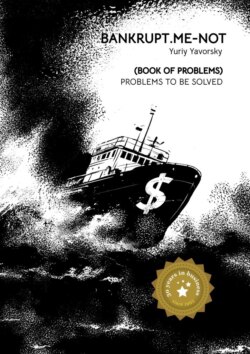Читать книгу Bankrupt.Me-Not. Book of Problems - - Страница 4
SECTION 1. MISTAKES
ОглавлениеIt’s axiomatic to learn from the mistakes of others.
PROBLEM 1
Given: no nuptial agreement. Businessmen share the ups and downs of both life and business with their families. No one would think of signing a nuptial agreement with their spouse.
Question: why is it important? Nearly everyone who one day decides to act as a guarantor by putting their signature under the text, hardly ever reads it before signing, nor will they re-read it after the hearing. However, everything given away as a present or sold during the three years, or 36 months to be precise, or 1,095 days to be exact before the court declares the company or the individual bankrupt, will be returned to the bankruptcy estate to be sold to settle the defaulter’s debts.
Solution: make sure to sign a nuptial agreement to avoid a lot а trouble for your family in the event of an unexpected bankruptcy.
PROBLEM 2
Given: consolidation of assets in the hands of a single person. It would seem perfectly logical to consolidate the successful parts of the business, to build the logistics and management systems in such a way that the business can be easy to manage and efficient. Training programs that teach that cost a lot of money, the experience comes with age and working your fingers ‘bloody’, while businesses cannot but benefit from this.
Question: why is it then, with all parts of the business legally consolidated, there is nothing a bankrupt-to-be can do once the torpedo of crisis suddenly cuts through the side of his business ship? All the bulkheads of the ocean liner that was all one just yesterday will get soaked and torn like paper under the forceful inflow of bailiffs, financial controllers, and other creditors who are out for financial ‘blood’.
Solution: de facto and de jure become very important at a time like this. The most important thing in business is that nothing that is de jure important should sit within anything else that is equally important.
PROBLEM 3
Given: underestimation of likely pitfalls. The government is always at the top of the economic food chain. There is no business in the world (and there will never be in the foreseeable future) that is absolutely and forever immune to crises, whether external or internal, and, accordingly, to the government’s decisions on crisis management or actions related to the here-and-now political goals.
Question: what can cause bankruptcy? There can always be room for betrayal, profligacy, envy, pathetic things done by the partners, owners or their families, as well as unreasonable decisions of the government or the nation’s leaders – for which there is no known cure. Natural disasters and wars, man-made woes and bad luck… The list goes on.
Solution: you must always be prepared for the possibility of bankruptcy.
PROBLEM 4
Given: no team around. If a business executive or entrepreneur is under enormous pressure in the face of looming bankruptcy and there is no team by his side, he is doomed.
Question: who can be in the team? It is not just your family in a literal sense but also your friends, acquaintances, subordinates – anyone who is prepared to help or to lose some of their material means or income, including bonuses, allowances, and other benefits, along with the business that is going bankrupt.
Solution: try to build your team well in advance.
PROBLEM 5
Given: reliance on stocks and reserves. Even when bankruptcy is imminent, you should never feel compelled to use your stocks and reserves.
Question: why won’t it help? Your stocks are always lower than the resources needed to avoid going bankrupt.
Solution: lock your stocks and reserves away until you need to start all over again.
